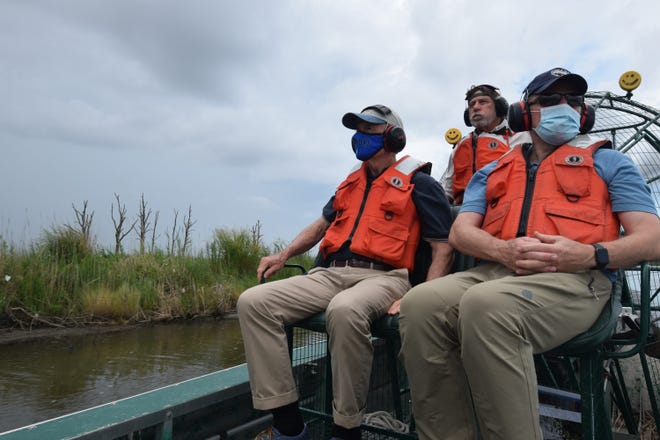Welcome to The Press Room, a weekly roundup of the major stories and happenings of the 2023 Delaware legislative year.
This week’s edition focuses on the first series of votes on recreational marijuana, early education legislation that has some bipartisan support and federal legislation to reauthorize the Delaware River Basin Act.
As always, send story tips, feedback, ideas or gossip to me at mnewman@delawareonline.com.
Follow me on Twitter at @MereNewman.
Here we go again: Delaware lawmakers to cast first marijuana legalization vote Tuesday
Lawmakers are back in session this week after the month of budget hearings – and face the first big test of the legislative year. The House of Representatives will vote on the first of two recreational marijuana bills.
A quick refresher: Delaware has tried to legalize weed for about a decade. Lawmakers got the closest they ever have last session by passing a bill that would legalize the possession of 1 ounce or less of marijuana. But then it got vetoed by Gov. John Carney, and everything fell apart.
The vote Tuesday is for House Bill 1, which is nearly identical to the one Carney stymied. And it’s expected to pass the House because it requires just a simple majority – which Democrats have. I’ll have my eye on how House Speaker Pete Schwartzkopf votes because he has previously been against legalization efforts.
DELAWARE POLITICSCould this be the year Delaware legalizes recreational marijuana? What you need to know
He and Rep. Bill Bush, from Dover, were the two Democrats who voted against the measure last year. Rep. Stephanie T. Bolden, who has also previously expressed trepidation, was absent during the vote last year.
The second piece of legislation, which would create and regulate a recreational marijuana industry, still needs to make its way out of the House Appropriations committee. That bill requires three-fifths support, which House Democrats likely have. Last year it failed due to a key lawmaker being sick.
The real question is if Democrats will face another veto fight this year with the governor, who has not changed his views on weed.
Early education bill package introduced with some bipartisan support
Democrats have introduced two bills aimed at improving access to early childhood education in Delaware.
Early childhood education is a major priority for this legislative session, specifically increasing the purchase of care rates. This is an early childhood and after-school education subsidy for about 15,000 children who, right now, live within 200% of the federal poverty limits.
The hope is by increasing the rate, the facility will be able to hire more people, allowing them to care for a greater number of children.
THE STATE OF EDUCATION:From test scores to mental health challenges, Delaware students are struggling. Here’s why
Senate Bill 59, which has bipartisan support, would require the health department to match the purchase of care rates in Kent and Sussex counties to that of New Castle County. For years, it has been lower below the canal. This will be heard in the Senate health committee on Wednesday.
The second bill, SB 58, would permanently remove purchase of care copayments for families that earn up to 200% of the federal poverty level. These payments were suspended during the pandemic. The legislation would also require the health department to pay childcare providers for up to 15 absent days per child per month for families.
Sen. Kyle Evans Gay, a Democrat from Brandywine Hundred who is sponsoring these bills, is also hosting a series of town halls in the coming weeks on early childhood education. Click here for more information.
Federal delegation announces legislation to reauthorize Delaware River Basin Conservation Act
U.S. Sen. Tom Carper and Rep. Lisa Blunt Rochester introduced federal legislation Monday that would reauthorize the Delaware River Basin Conservation Act until 2030.

The act, which was first authorized in 2016, supports conservation efforts and stewardship of the Delaware River. The legislation has awarded $40 million to habitat conservation and water quality of the river, which provides drinking water to 13 million people in the region.
The Delaware projects include removing the dam at White Clay Creek, improving fish passage in the Brandywine and restoring wetlands at Bombay Hook and Prime Hook national wildlife refuges.